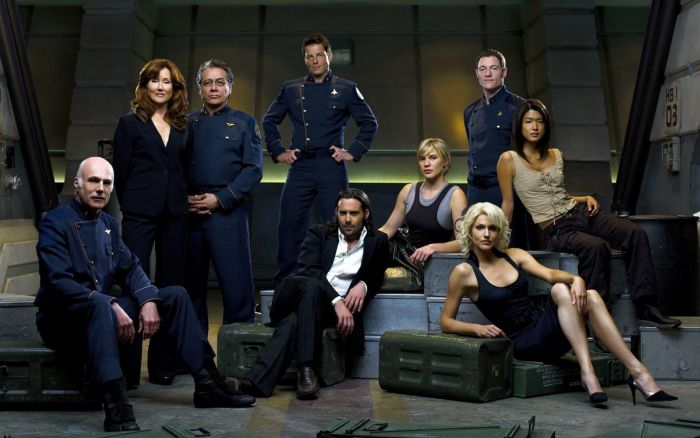Battlestar Galactica must self-destruct?

In our rush to get ready for the fourth and final season of Battlestar Galactica, Renae and I have been plowing through Season 3 on DVD, and have been enjoying it quite a bit — not as much as Season 2, but it’s still one heck of a show. Unfortunately, we weren’t finished before Season 4 kicked off — but that’s where our DVR came in and saved our pop culture-devouring butts.
Which brings me to the oddly titled “Scott Brown on Why Battlestar Galactica Must Self-Destruct.” Oddly titled because it doesn’t really explain why, exactly, BSG must self-destruct, unless that’s an oblique reference to the fact that BSG is a product of our times — and those times are a-changin’.
After all, this is a show that has touched on all manner of issues that are torn directly from the headlines: political corruption, election rigging, torture, the confluence of religion and politics, and so on. So perhaps Brown is making a point that some critics have posited: that BSG’s popularity is a result of the Bush administration and its policies. And with Bush on the way out, BSG is bound to become archaic and deprecated in just a few months’ time.
That’s a somewhat suspect claim if you ask me and yet, when you’ve got a prominent storyline involving a military force invading and attempting to set up a new society, which causes the invaded to respond with suicide bombings and guerilla attacks on their occupiers — well, it does cause one to wonder. If September 11, Iraq, and/or the “war on terror” hadn’t happened, would there even be a Battlestar Galactica? Or if there was, would it even bear any similarity to the series that we all know and love?
As I’ve written before, I believe the real reason behind BSG’s popularity lies in its frightening immediacy and relevancy. As is the case with all great science-fiction, it functions primarily as parable and prophecy — not of some glorious, utopian future but of the “here and now” in all of its grit, grime, gloom, and glory. It touches on powerful current issues and explores them using story and myth, and it does so — and this is the important point — without an obvious agenda, as evidenced by its characters’ oftentimes very murky morality and motivations.
Or, as Brown puts it:
BSG is, at first glance, an unlikely vessel for serious sociopolitical critique. While science fiction may be the genre of Big Ideas, it’s fair to say no one expected Howard Zinn-level watchdoggery from the “reimagining” of a chintzy ’70s TV series starring Dirk Benedict by the basic cable network that also gave us Mansquito. BSG enters its fourth and final season in April, and none of its fans expect encomiums on par with The Sopranos. Yet BSG has done for the post-Roddenberry space western what Tony and Co. did for the post-Coppola mob tale: exhumed a mummified subgenre and reanimated it with all the relevant eschatological dread and martial hysteria of millennial America. BSG was, for a while there, the most important show on television.
I still think it’s a pretty important show, and we’ll see how that bears out during the fourth season.
Personally, I’m hoping that the show sticks to its guns, that even as the credits are rolling on the series finale, there are plenty of scars, wounds, and smoking craters to go around. That there are plenty of questions left unanswered. Heck, I don’t think I’d feel too disappointed if the fleet never actually makes it to Earth, if good ol’ Terra Firma turns out to be more of a MacGuffin than anything else. But we’ll see, and I can hardly wait.